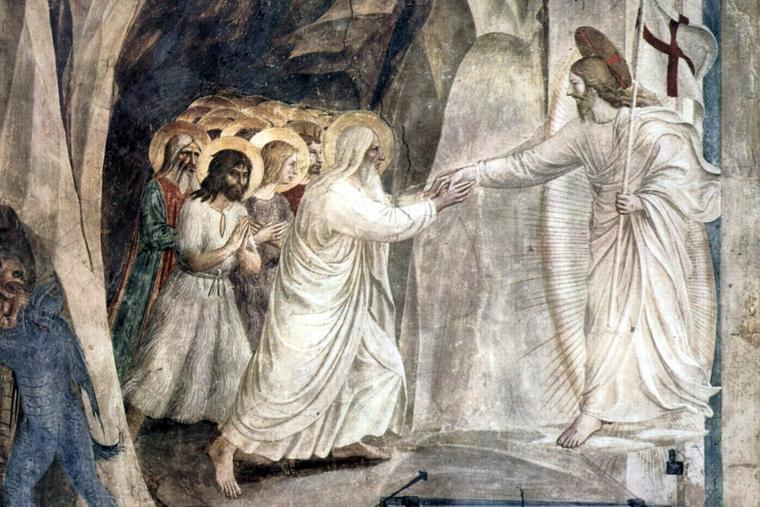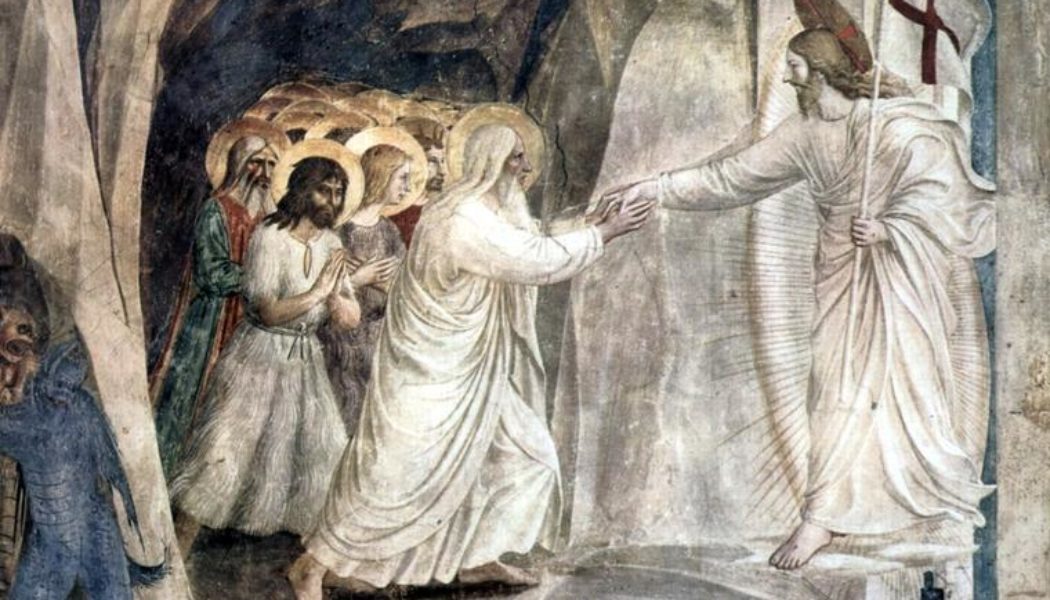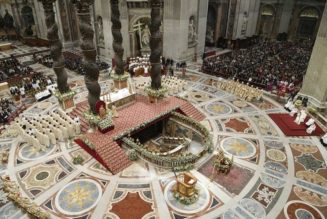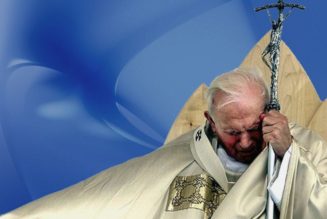
Pope Francis stirred up controversy with an informal remark concerning hell that he made Jan. 14 in an hourlong live interview with a popular Italian television program.
While acknowledging that this is only his personal view, not “a dogma of faith,” the Holy Father speculated that hell may be empty and expressed the hope that it is the case: “What I am going to say is not a dogma of faith, but my own personal view: I like to think of hell as empty; I hope it is.”
First of all, what is “dogma”?
In brief, a dogma is a declaration of the Church concerning a truth revealed by God that is necessary for our salvation. And while the Pope is only offering his personal speculation about the possibility of hell being empty, which he hopes it is, and he is clear that this is not official Church teaching, it is nevertheless still extremely damaging.
It plays into a widespread sympathy towards a heresy called “universalism,” which teaches that perhaps — or certainly — everyone will eventually end up in heaven. In some variations, even the devil and the demons will be saved. But more about this later.
In this environment, then, it is extremely important that we know what God has revealed to us about the reality of hell and how possible it is to end up there. Unfortunately, these very important truths are seldom preached about or taught. But the good news is the Pope’s remarks allow for a teaching moment, where attention to these truths can be paid.
Fortunately, we have today the Catechism of the Catholic Church, which reliably hands on the constant Church teaching about the Four Last Things (death, judgment, heaven and hell). We need to know what the Church teaches regarding hell if we are going to keep our head clear and our feet on the right path in this climate of confusion, wishful thinking and denial.
What Does the Catechism Teach?
Basing itself on sacred Scripture and sacred Tradition, the Catechism clearly teaches that anyone who dies unrepentant in mortal sin will go directly to hell:
“[Hell is the] state of definitive self-exclusion from communion with God and the blessed, reserved for those who refuse by their own free choice to believe and be converted from sin, even to the end of their lives” (1033).
“The teaching of the Church affirms the existence of hell and its eternity. Immediately after death the souls of those who die in a state of mortal sin descend into hell, where they suffer the punishments of hell, ‘eternal fire.’ The chief punishment of hell is eternal separation from God, in whom alone man can possess the life and happiness for which he was created and for which he longs” (1035; see also 393).
This teaching, based on Scripture, is that since we are bodily creatures, our resurrected bodies will participate in the eternal joys or eternal horrors of our ultimate destinies. The twofold suffering of hell is traditionally described as the pain of loss and the pain of sense.
In 1979, under Pope John Paul II, the Congregation for the Doctrine of the Faith responded to some questions on eschatology (doctrine concerning the ultimate or final things), and it reaffirmed the traditional teaching:
“In fidelity to the New Testament and tradition, the Church believes in the happiness of the just who will one day be with Christ. She believes that there will be eternal punishment (poena aeterna) for the sinner who will be deprived of the sight of God, and that this punishment will have a repercussion on the whole being of the sinner” (7).
The Catechism calls each Catholic to live their lives in the light of eternity, with the biblical worldview controlling their understanding and decisions. This is not ivory-tower theology or abstract, rigid truths. They are words of warning and words of life, with our happiness in view.
A very common way of evading the clarity of this teaching is to question whether it is really possible to commit a mortal sin, or for those apparently living in a state of mortal sin, whether they are really culpable or not.
The Catechism clearly addresses these objections. First of all, it states that no one should be deemed ignorant of the natural law, that is, the common human perception that unjust killing, stealing, lying, cheating and committing adultery is wrong. The Catechism further teaches that all human beings have an obligation to seek the truth about God and can’t comfortably rest in their supposed ignorance (1791). It even acknowledges, as the prophet Jeremiah does, that the human heart is often desperately corrupt — and that feigning ignorance of the grave wrong that we are doing is especially culpable (1857-1861).
Objectively Wrong Actions Are Still Wrong
And the critical truth remains: No matter how much culpability may be reduced, objectively wrong actions are still wrong and are intrinsically evil, damaging the people who engage in them whether they are culpable or not.
I treat these issues at length in Chapter 6 — “Is Anyone Responsible?” — in my book A Church in Crisis: Pathways Forward (Emmaus Road, 2021). We should not focus on how culpable we or others are, but rather on how gravely wrong what we are doing is, and make every effort to break free, with the grace of God, from such objectively wrong actions that damage us and others, whatever our degree of culpability. I think this better reflects Jesus’ counsel on the matter of grave sin:
“You have heard that it was said, ‘You shall not commit adultery.’ But I say to you that everyone who looks at a woman lustfully has already committed adultery with her in his heart. If your right eye causes you to sin, pluck it out and throw it away; it is better that you lose one of your members than that your whole body be thrown into hell. And if your right hand causes you to sin, cut it off and throw it away; it is better that you lose one of your members than that your whole body go into hell” (Matthew 5:27-30).
Jewish hyperbole? Yes. Don’t pluck out your eye or cut off your hand if they are instruments of sin. But do everything you possibly can to get free from serious sin, since it will send you to hell if you don’t. This is a message that needs to be heard much more frequently today and with great urgency and authority, the urgency and authority of Jesus.
The Catechism states, “The affirmations of Sacred Scripture and the teachings of the Church on the subject of hell are a call to the responsibility incumbent upon man to make use of his freedom in view of his eternal destiny. They are at the same time an urgent call to conversion: Enter by the narrow gate; for the gate is wide and the way is easy, that leads to destruction, and those who enter by it are many. For the gate is narrow and the way is hard, that leads to life, and those who find it are few” (1036; see also 1734, 1428).
Since we know neither the day nor the hour, we should follow the advice of Our Lord and watch constantly so that, when the single course of our earthly life is completed, we may merit to enter with him into the marriage feast and be numbered among the blessed, and not, like the wicked and slothful servants, be ordered to depart into the eternal fire, into the outer darkness, where “men will weep and gnash their teeth” (Luke 13:28).
Sometimes people say we should not scare people into conversion. Yet fear of hell and the consequences of sin is an excellent start to the spiritual journey. Sts. Teresa of Avila, Francis de Sales and Ignatius of Loyola attest to the valuable role fear of hell plays in motivating the spiritual journey. As we know, the spiritual journey does not end there. It leads to “perfect love casting out fear” (1 John 4:18) of punishment, but that is the journey of a lifetime. The reality is that hell exists, and the unmistakable thrust of Scripture and the traditional interpretation of such Scriptures by the Church’s greatest theologians is that it is very likely that many people go there.
No Significant Change
Cardinal Avery Dulles, perhaps the leading American theologian of the 20th century, asserted in a 2003 essay for First Things that up until the middle of the 20th century, there was no significant challenge to the traditional two outcome views of the Catholic Church — and that the prevailing theological consensus interpretation of sacred Scripture was that more were lost than were saved:
“As we know from the Gospels, Jesus spoke many times about hell. Throughout his teaching, he holds forth two and only two final possibilities for human existence: the one being everlasting happiness in the presence of God, the other everlasting torment in the absence of God. … Taken in their obvious meaning, passages such as these give the impression that there is a hell, and that many go there; more in fact, than are saved.”
Knowing these truths about the Last Things and the reality of the Final Judgment and its twofold outcome, heaven or hell, was so important that Jesus and the apostles often warned about it. In parable after parable and in apostolic writing after apostolic writing, God is revealing to us that there will be a final separation of the human race at the end of time. The weeds will be thrown into the fire and burned; the wheat brought into the barn (Matthew 13:36-43). The wise virgins will enter the wedding feast, while the foolish virgins won’t (25:1-13); the good fish will be kept and the bad thrown away (13:47-50); the sons of the devil will be excluded from the Kingdom, as the sons of God will enter (1 John 3:10); those who were sympathetic to Jesus and even ate and drank with him but who didn’t believe in him or obey him will be excluded from the Kingdom (Luke 13: 22-30); those who believed and obeyed will enter.
“The resurrection of all the dead, ‘of both the just and the unjust,’ will precede the Last Judgment,” says the Catechism (1038). “This will be ‘the hour when all who are in the tombs will hear [the Son of man’s] voice and come forth, those who have done good, to the resurrection of life, and those who have done evil, to the resurrection of judgment.’ Then Christ will come ‘in his glory, and all the angels with him. … Before him will be gathered all the nations, and he will separate them one from another as a shepherd separates the sheep from the goats, and he will place the sheep at his right hand, but the goats at the left. … And they will go away into eternal punishment, but the righteous into eternal life’” (1038; see also 1001, 998).
There are numerous attempts to explain away the plain meaning of Scripture and its constant interpretation by the Church: Sometimes by sophisticated theological speculation, sometimes by wishful thinking and foolish presumption, the result of darkened minds; sometimes by just ignoring it in the hopes that it will recede into the background and wither away, without having to deny it; sometimes by just going along with the popular culture that no longer takes such truths seriously.
This mindset, combined with the Jan. 14 statement of Pope Francis, has reenergized the universalist thought and sentiment that is affecting many Catholics. Well-respected theologians like Karl Rahner and Hans Urs von Balthasar have speculated about the possibility of there being an empty hell and have clearly let their sympathies be known for that probably being the case, as I underscore in my book Will Many Be Saved? What Vatican II Actually Teaches and Its Implications for the New Evangelization (Eerdmans, 2013). These theories have infiltrated the thinking of many religious educators and clergy and have reached the ordinary Catholic, as well.
The fact that, in the aftermath of Vatican II, the Church has not emphasized the clear and certain dogmatic tradition about the Four Last Things has led many Catholics to forget these truths or wonder if we still believe them.
If we hold the belief that hell is empty, probably empty or sparsely populated, there is a natural tendency for humanity to pay more attention to “improving the world” and sympathizing with the world’s causes than to focus on the bold proclamation that the name of Jesus is the only name that can save anyone (Acts 4:12). Or that people need to “save themselves from this wicked generation” (Acts 2:40), through repentance, faith and baptism. Or that in order to escape the wrath that is coming (1 Thessalonians 1:10), they need to join themselves to Jesus and the Church and obey his commands.
If hell is empty — or quite possibly could be — do we really need any more to insist that what Jesus and the apostles teach on the purpose of human sexuality and marriage must be obeyed in order to be saved? Or could we fudge it a little to better get along with “modern man”?
This is not just an esoteric discussion on “dogma.” The truths concerning the ultimate destinies of human beings are the most important truths for people to know; and, unfortunately, they are seldom spoken about anymore. Most frequently, they are publicly doubted, inspired most recently by the personal hope of Pope Francis, or simply ignored, which after a period of time casts doubt concerning their importance or truthfulness.
Ralph Martin is the president of Renewal Ministries and the director of graduate theology programs in the New Evangelization at Sacred Heart Major Seminary in the Archdiocese of Detroit.








